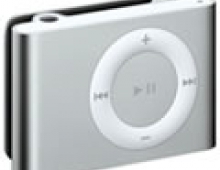
Gadget makers fear new copyright levies hurt sales
Electronics manufacturers railed against a European tax on recordable discs and music players like iPods on Friday, even as a Dutch industry group was getting ready to impose new local levies on recordable media.
Top executives of Nokia and Philips Electronics in an open letter published on Friday said that the tax on blank media, designed to compensate artists for private copying, was out of date and that many consumers were already paying twice as they purchase digital content legally on the Internet and subsequently store it on a recordable compact disc.
Nokia Multimedia chief Anssi Vanjoki, Philips Consumer Electronics head Rudy Provoost and others urged the European Commission to reform the "antiquated system of rough justice" as the law comes up for evaluation this year.
Also on Friday, electronics producers in the Netherlands said they were at stalemate in talks with the entertainment industry and that the chairman of their joint industry group SONT is ready to set levies for new devices in the country.
These would mean an mp3 player like an Apple iPod would cost 25 euros ($32) more and a hard disk TV recorder 80 euros, the electronics industry's lawyer, Dirk Visser, said.
"This will lead to double or triple taxation. Soon, a consumer will pay rights to the artists when he buys on iTunes, then again when he buys a blank disc and undoubtedly it will be extended to mobile phones which can also store music," he said.
SONT Chairman Henk Vonhoff was not immediately available to comment, but a representative for the Dutch entertainment industry said that no decision had yet been taken to implement new levies for new devices such as iPods.
"The chairman has to execute the law (which says that blank media need to be taxed), but whether the levy will be one or 100 euros still needs to be discussed," said Paul Solleveld of Dutch entertainment industry organization NVPI.
The 1.2 billion euros charged in EU-directed copyright levies on digital media and equipment in 2005 actually cost the community an extra 2.1 billion euros in missed sales, according to a study from the Copyright Levies Reform Alliance (CLRA).
EU states where it is imposed -- some countries such as Britain have no levy on blank discs -- are expected to collect 1.57 billion euros this year and 2.12 billion in 2009. If disputed, additional local levies in the Netherlands, Austria, Germany and Spain were introduced, the amount collected would rise to 4.67 billion euros in 2009, according to the CLRA.
Meanwhile, distribution of the money in the Netherlands among artists has led to huge delays and complaints, and an investigation ordered by the Justice Ministry was full of criticism of the system in its report in December 2005. The levy itself dates back to the 1960s, when it was introduced on blank tapes to compensate performers for private copying of copyrighted music.
The European Commission will publish its views by the year end, but could meet resistance to change from individual states as a third of the money raised goes to government coffers to promote cultural activities.
Nokia Multimedia chief Anssi Vanjoki, Philips Consumer Electronics head Rudy Provoost and others urged the European Commission to reform the "antiquated system of rough justice" as the law comes up for evaluation this year.
Also on Friday, electronics producers in the Netherlands said they were at stalemate in talks with the entertainment industry and that the chairman of their joint industry group SONT is ready to set levies for new devices in the country.
These would mean an mp3 player like an Apple iPod would cost 25 euros ($32) more and a hard disk TV recorder 80 euros, the electronics industry's lawyer, Dirk Visser, said.
"This will lead to double or triple taxation. Soon, a consumer will pay rights to the artists when he buys on iTunes, then again when he buys a blank disc and undoubtedly it will be extended to mobile phones which can also store music," he said.
SONT Chairman Henk Vonhoff was not immediately available to comment, but a representative for the Dutch entertainment industry said that no decision had yet been taken to implement new levies for new devices such as iPods.
"The chairman has to execute the law (which says that blank media need to be taxed), but whether the levy will be one or 100 euros still needs to be discussed," said Paul Solleveld of Dutch entertainment industry organization NVPI.
The 1.2 billion euros charged in EU-directed copyright levies on digital media and equipment in 2005 actually cost the community an extra 2.1 billion euros in missed sales, according to a study from the Copyright Levies Reform Alliance (CLRA).
EU states where it is imposed -- some countries such as Britain have no levy on blank discs -- are expected to collect 1.57 billion euros this year and 2.12 billion in 2009. If disputed, additional local levies in the Netherlands, Austria, Germany and Spain were introduced, the amount collected would rise to 4.67 billion euros in 2009, according to the CLRA.
Meanwhile, distribution of the money in the Netherlands among artists has led to huge delays and complaints, and an investigation ordered by the Justice Ministry was full of criticism of the system in its report in December 2005. The levy itself dates back to the 1960s, when it was introduced on blank tapes to compensate performers for private copying of copyrighted music.
The European Commission will publish its views by the year end, but could meet resistance to change from individual states as a third of the money raised goes to government coffers to promote cultural activities.



















